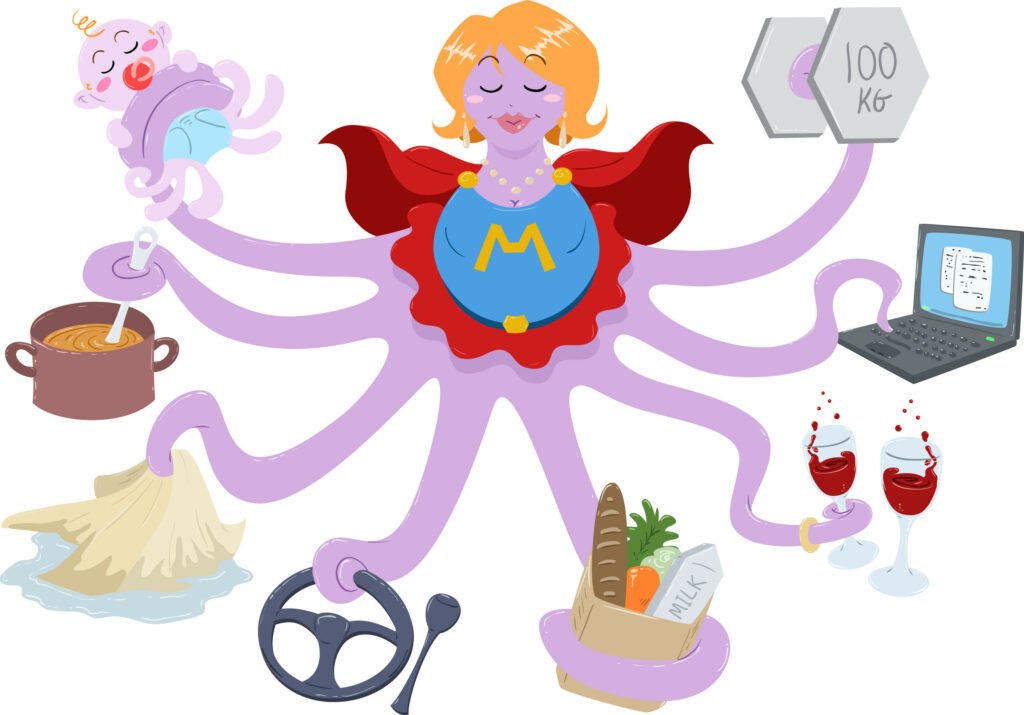‘Superwoman’ is an analogy for a woman who seems to be effortlessly managing all the roles attached to her by a society which includes the roles of a mom, traditional housewife, successful career woman and a long list of other social roles. The more roles attached to them, the longer the cape of the superwoman. The term ‘superwoman syndrome’ was coined by Marjorie Hansen Shaevitz in 1984 in her book ‘The Superwoman Syndrome’.
The term became widely popular during the second wave of feminism when women became liberated to join the workforce and become financially independent but at the same time, they couldn’t break away from the roles of traditional housewives or leave behind their dependent families.

“While women’s attitudes changed and they expanded their roles, men didn’t expand their roles to encompass the domestic and childcare responsibilities traditionally undertaken by women. Women are thus left to occupy two roles”. To this day women are applauded and take great pride in juggling multiple social roles in their life but the result is burnout. Women are left to become physically, emotionally and mentally exhausted while carrying the burden of the cape of superwoman.
Is it a choice?
Despite having a full-time job and contributing to the income of the household, employment for women is perceived as a secondary task that should be accommodated with their primary roles of meeting domestic demands and responsibilities. In contemporary Indian society, women have to fight for their right to employment or have to get permission from their husbands to have full-time jobs. In a recent video that shocked the internet, a man from the Thiruvananthapuram district of Kerala was seen to be beating his wife for defying him and refusing to quit her job at a supermarket. The woman with a blood-soaked face can be seen explaining in the video that she has to go for a job to repay her loan. With the increasing cost of living, double income is not a luxury but a necessity that demands women take up jobs by managing their households simultaneously.
Married women and mothers are often blamed for the mishaps in their households. A mother is often expected to live for their children and their maternal instincts are questioned when their domestic tasks appear unsatisfactory. The role of a husband or father is considered minimal in a household. These circumstances force them to strive and prove to society that they are not neglecting their traditional responsibilities and are capable of accommodating a job.

This often pushes women to overwork and become a superwoman. In our conservative society, a career for women is perceived as a choice. “While women are not expected to take up careers by men, for many women, however, such a choice in itself would appear to be a luxury, many being forced to work out of financial necessity, irrespective of the double burden placed on them.” Women are not superwomen by choice, the expectations, the need to become financially independent and the strive to break free from the traditional gender roles drive them to become one.
The desire to become superwoman
The pressure to attain perfection in all their tasks creates an unrealistic ideal in women’s minds known as the superwoman ideal. This idea is inspired by well-known successful working mothers who appear to ‘do it all. This creates a certain competition among women in their pursuit of perfection. This comparison inspires them to become a more successful version of a superwoman and leads to exhaustion. Superwomen rarely seek help and they are often not offered any help while pursuing their tasks.
Also read: The Super‘HER’o Agenda: Representation Of Women Characters In Action Movies
Women rarely complain about their role as superwomen and rarely notice the weight of their capes. “Men either believe women can be superwomen or they simply do not expect women to have a progressive career”. Household work is simply perceived as a second shift women take up just because they are superwomen.

Despite overworking and pressuring to reach the best version of themselves, a survey quotes that the gender gap persists in the payment of wages in Indian workplaces and a women’s median hourly wage is 25.4 percent less than men’s. This shows how the physical and mental exhaustion faced by women is ignored and normalised in society. The struggles and burnout of a superwoman thereby remain hidden by their cape.
To let go of the cape
A woman’s worth shouldn’t be attached to the cape or by the number of roles she plays in the lives of her family and society. They must be encouraged to embrace flaws and feel content in their individual self which helps them to let go of the image of superwomen. Women deserve happiness, care, and hours of leisure like any other individual in their life. Despite the myth of contemporary times that traditional household chores are equally divided among partners in a household, women tend to overwork in the belief that their male counterparts are domestically incapable of managing the household. Men should expand their roles and share the tasks of the household; this will help both men and women make better choices of tasks without causing burnout.
To let go of the cape of superwomen, women must feel good about being their individual selves. Recently, Jacinda Ardern announced her decision to resign from her position as the youngest Prime Minister of New Zealand. This was shocking to the world who saw Jacinda as a powerful leader who was a strong figure in dealing with the pandemic in New Zealand, Christchurch mosque shootings, White Island volcanic eruption, being vocal for progressive issues and also being an admirable mother who gave birth while in office. She quotes, leading a country is one of the most privileged jobs anyone could ever have but also one of the most challenging and she acknowledges ‘I no longer have enough in the tank’.
This world leader who acknowledged burnout and drew boundaries for herself is a beautiful example of a superwoman who let go of her cape. Knowing one’s boundaries and stopping oneself from going beyond them is necessary for the physical and mental welfare of an individual.
Also read: The Superwoman Who Lived Next Door
The superwomen we see in our daily lives are always exhausted, mentally and physically. They may not show it or others may not see it. Women should be kinder to themselves to tackle superwoman syndrome. In their busy life as a superwoman, they forget their dreams and their source of happiness is mostly their family’s happiness. They lose their individuality and dreams by becoming a superwoman. They must be constantly reminded of their personal goals and dreams. Although the strong conditioning faced by women pushes them to remain a superwoman, the pursuit of dreams and happiness might loosen up their capes and help them reclaim their individual selves.




